

Marc Jacobs accused of 'cultural appropriation' as models wear fake dreadlocks. It was a fashion show that got everyone talking.

Unfortunately, it wasn't the clothes that made the headlines at Marc Jacob's New York Fashion Week show. It was the designer's controversial decision to use a cast of predominately white models - which included Kendall Jenner and Gigi Hadid - with huge multicolored wool dreadlocks. Marc Jacobs has come under fire for 'cultural appropriation'. Pictured is Bella Hadid as she models dreadlocks and a see-through lace dress Many people online have blasted Marc Jacobs for the move, accusing the brand of cultural appropriation. 'Dreadlocks are part of black culture, something you have no business trying to sell or appropriate.
Others questioned why there were so few black models in the show. 'Dreadlocks and yet no black models. Marc Jacobs say the look was inspired by rave culture, London 1980s fashion and and Harajuku girls - black culture was not mentioned. How Brexit may affect the British fashion industry. Ondon has been long considered one of the world’s fashion and financial capitals, as one of the world’s most creative and vibrant cities.
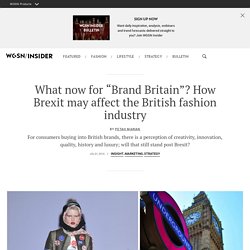
But what will the Brexit vote mean globally for “Brand Britain”? While facing reputational damage in Europe following the UK’s vote to exit the European Union, London’s perception as a cosmopolitan, multicultural hub has been dealt a second blow as the spate of racially motivated hate crimes make headlines around the world. London has garnered its reputation as a cool city because it is a place where worlds constantly collide – a city where the sari silk stores of Brick Lane rub up against the Savile Row-suited bankers of Bishopsgate. It is exciting because in a city of 8.5 million people, three million are foreign born, bringing together a diverse range of world views, to create new experiences and amazing products. For brands trading on notions of Britishness – from Savile Row to Topshop, this once solid association is now less of a good bet.
How retailers can fashion their way through Brexit. Fashion’s most iconic political statements. As the date of the UK election draws nearer, politicians have turned their attention to fashion and pop culture in an attempt to wrest the youth vote.
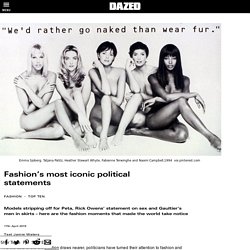
David Cameron has claimed Kardashian kinship, Nick Clegg has starred in an “Uptown Funk” election anthem, and the Labour Party has channelled Katharine Hamnett with their “Hell Yes” slogan tee. These recent antics come as no surprise – fashion and politics have long been linked. Last week we paid tribute to Dame Vivienne Westwood’s best protests, one of the great masters of using fashion as a vehicle for social commentary. Now we turn our attention to other designers who have used their clothes to shine a spotlight on important issues.
From men’s skirts, anti-terrorist slogans and Pussy Riot films, to penises on the catwalk, feminist runway protests and reflections on wartime hardships, here are the most memorable political statements in fashion history. Female Fashion Designers Are Still in the Minority. LONDON, United Kingdom — Gender parity is an elusive goal for many industries and fashion is no exception, with men disproportionately dominating top roles across all areas of business.
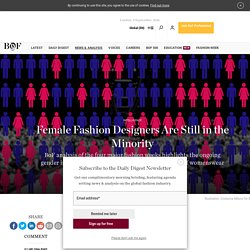
It is a particularly ironic state of affairs for an industry where women make up the overwhelming majority of the consumer base. Despite the recent trend for gender neutrality on the catwalk, behind the scenes female designers are still outnumbered. For the Spring/Summer 2017 fashion week season, which kicked off with New York Fashion Week this Thursday, BoF has analysed the womenswear brands showing across New York, London, Milan and Paris fashion weeks. Our findings show that there are more male designers creating clothing for women than there are women. Of the 371 designers helming the 313 brands surveyed by BoF across the four fashion weeks, only 40.2 percent are female. “Women unfortunately are still seen as a minority,” says Julie de Libran, artistic director of Sonia Rykiel. Related Articles: Brexit: What the European papers say. Image copyright Le Figaro The debate in Britain about how and when to leave the European Union continues to interest the press on the continent.
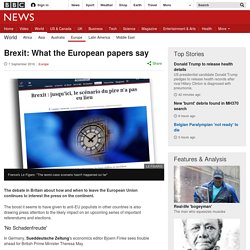
The boost it seems to have given to anti-EU populists in other countries is also drawing press attention to the likely impact on an upcoming series of important referendums and elections. 'No Schadenfreude' In Germany, Sueddeutsche Zeitung's economics editor Bjoern Finke sees trouble ahead for British Prime Minister Theresa May. He says she is trapped between a "growing realisation" that Britain depends on continued access to the EU internal market and popular pressure at home to limit freedom of movement.
"May has promised not to cede sovereignty over Britain's borders during the negotiations with Brussels," he says. But he also warns against "Schadenfreude" towards Britain, arguing that its political and economic weight means it cannot just be "cut off to bob around somewhere far out in the Atlantic". Image copyright Rzeczpospolita. TUC: 'No place to hide' warning over exploitation. The TUC has warned companies that there will be "no hiding place" if they exploit their workers.
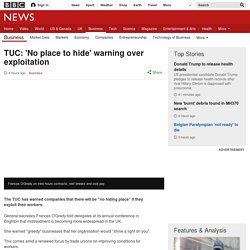
General secretary Frances O'Grady told delegates at its annual conference in Brighton that mistreatment is becoming more widespread in the UK. She warned "greedy" businesses that her organisation would "shine a light on you". This comes amid a renewed focus by trade unions on improving conditions for workers.